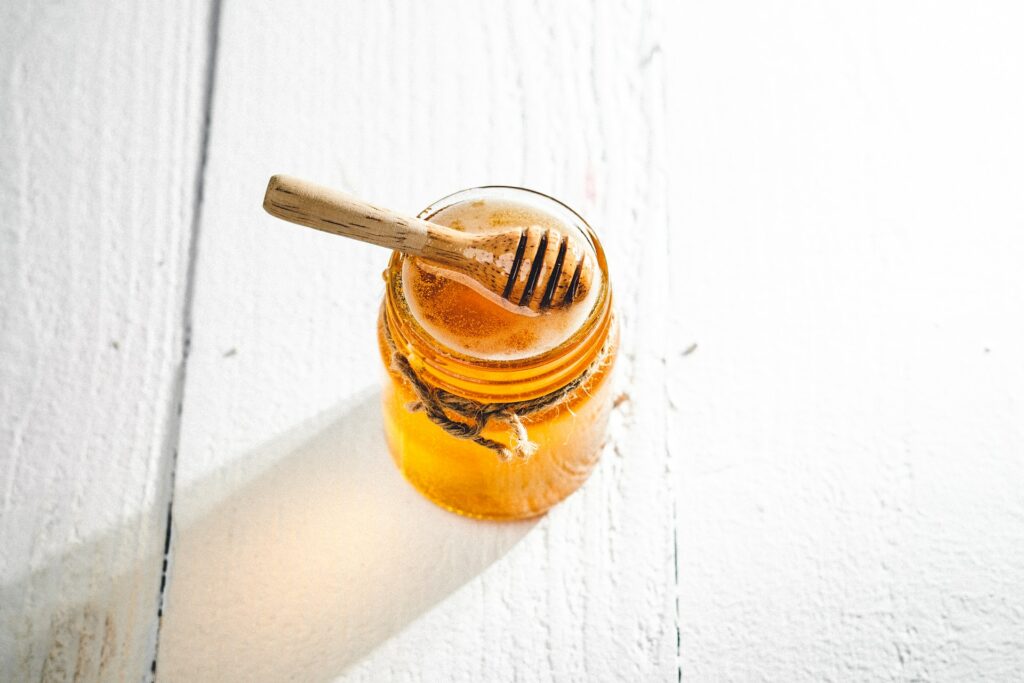


When you think about natural remedies to help you sleep, some of the things that comes to mind would be melatonin or a glass of warm milk. But did you know that you can take honey for sleep too?
Aside from the numerous health benefits, find out how honey can help you improve your rest as well as other remedies.
This article explores the potential benefits of honey for sleep and whether it can truly improve your rest.
If you’re looking for a safe and effective remedy to alleviate coughing, honey has been found to be a viable option for children aged 1-5 years, according to a study published in 2007.
Honey can also be beneficial for promoting restful sleep. Honey before bed has been shown to improve sleep quality and can be helpful for those struggling with insomnia.
Raw honey, in particular, contains tryptophan, which gets converted into serotonin and melatonin, hormones that promote sleep. Additionally, honey provides glycogen storage, fueling the liver and easing stress hormones, which can contribute to a better night’s sleep.
Incorporating honey into your sleep routine, whether through consuming it directly or adding it to beverages like warm milk or herbal teas, may help improve your sleep and overall well-being.
To improve your sleep quality, consider incorporating honey into your bedtime routine on a regular basis. Honey has been shown to have potential benefits for promoting restful sleep.
Before you go to bed, try consuming a teaspoon of honey to improve your sleep quality. Honey contains tryptophan, which gets converted into serotonin and melatonin in the body, promoting sleep. It also provides glycogen storage to fuel the liver and ease stress hormones, which can aid in falling asleep.
You can consume honey on its own or mix it with warm milk or herbal teas like chamomile or ginger for a soothing effect before bedtime.
Give it a try and see if honey can help you achieve a more restful sleep. To ensure you get better sleep every night, download ShutEye®.
Try incorporating other natural remedies for insomnia into your bedtime routine to improve your sleep quality. In addition to honey, there are several other options that can help promote better sleep. Consider trying the following natural remedies:
| Remedy | Benefits | How to Use |
|---|---|---|
| Bananas | Contains melatonin and tryptophan for inducing sleep | Eat a banana before bed |
| Lemon balm | Acts as a numbing agent and aids in relaxation and sleep | Steep lemon balm in boiling water and drink before bed |
| Lettuce tea | Contains lactucarium, a sleep-inducing property | Drink lettuce tea with raw honey before bed |
| Essential oils | Lavender, jasmine, and rosemary can promote better sleep | Use a diffuser or apply topically before bed |
| Relaxation techniques | Breathing exercises, meditation, and yoga can help relax the body and mind before bedtime | Practice these techniques before bed |
These natural remedies can help improve sleep quality, reduce nocturnal cough, and promote restorative sleep. It’s important to remember that individual results may vary, and it’s always a good idea to consult with a healthcare professional if you have persistent sleep issues.

If you’re struggling with insomnia, it’s important to seek professional advice.
Insomnia can greatly affect your quality of life and overall well-being, and getting the right guidance can help you find effective solutions. While honey may help improve rest for some individuals, it isn’t a cure-all for insomnia.
Seeking professional advice will allow you to address the underlying causes of your sleep troubles and explore a range of treatment options tailored to your specific needs.
A healthcare professional can conduct a thorough evaluation, recommend lifestyle changes, and discuss potential therapies or medications that may aid in improving your sleep.
In conclusion, honey shows promise as a natural remedy for improving sleep. Its ability to stabilize blood sugar levels, provide energy for the brain, and contain tryptophan, a precursor to melatonin, suggests potential benefits for promoting restful slumber.
Additionally, honey’s antioxidant properties and potential to suppress coughing further contribute to its potential as a sleep aid. If you don’t want to consume any products, you may also consider trying ShutEye® to help you track your sleep. ShutEye® also offers sleep aids such as sleep sounds, sleep stories and guided meditations.
Goldman R. D. (2014). Honey for treatment of cough in children. Canadian family physician Medecin de famille canadien, 60(12), 1107–1110.
Kim, T. K., Atigadda, V. R., Brzeminski, P., Fabisiak, A., Tang, E. K. Y., Tuckey, R. C., Reiter, R. J., & Slominski, A. T. (2021). Detection of Serotonin, Melatonin, and Their Metabolites in Honey. ACS food science & technology, 1(7), 1228–1235. https://doi.org/10.1021/acsfoodscitech.1c00119